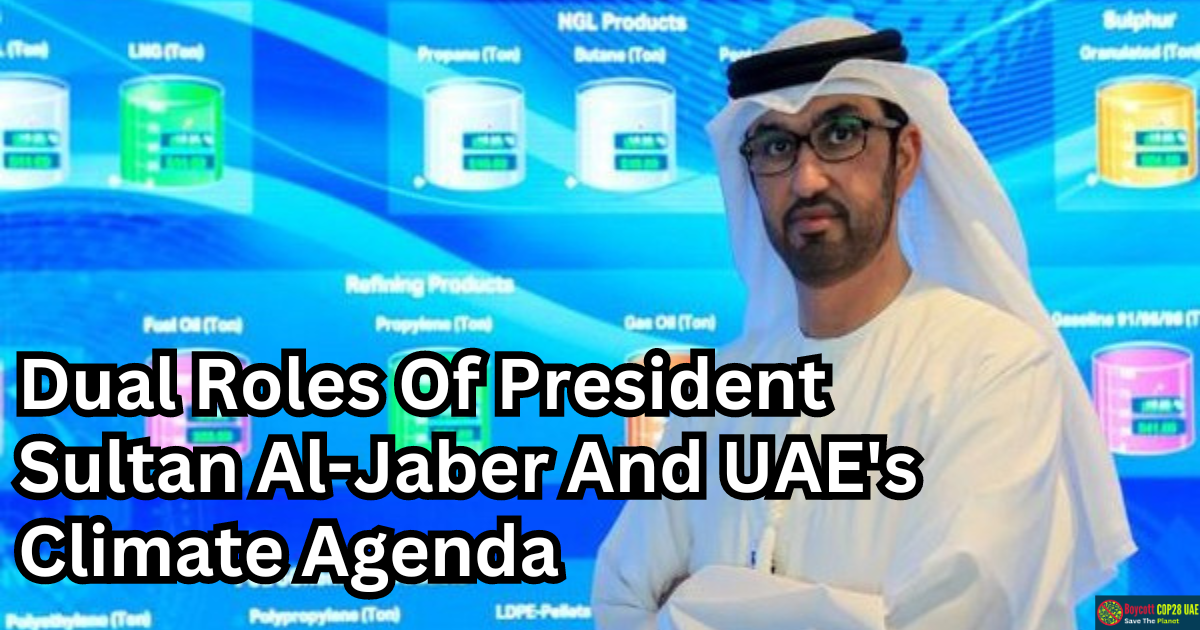As the countdown to COP28, the 28th United Nations Climate Change Conference, on November 30 approaches, environmental activists around the world are cautiously anticipating the event. The gathering, aimed at addressing pressing climate issues, has already attracted controversy and raised concerns about the United Arab Emirates (UAE) and its President, Sultan Al Jaber, utilizing the platform to advance their interests. In this article, we explore the controversies surrounding Sultan Al Jaber’s dual roles and how the UAE’s presence in COP28 might be used to greenwash its petro-friendly agenda, potentially perpetuating human rights violations.
COP28 President’s Dual Roles Stir Controversy
The selection of Sultan Al Jaber as the President of COP28 has triggered criticism and skepticism due to his dual roles in the UAE’s government and the oil industry. Al-Jaber currently serves as the CEO of the Abu Dhabi National Oil Company (ADNOC), the Middle East’s largest national drilling company, boasting a substantial rig fleet. ADNOC has recently unveiled plans to invest a staggering $150 billion over the next five years, primarily focusing on expanding oil production. Presently, the company extracts 2.7 million barrels of oil daily, with aspirations to ramp it up to five million barrels by 2027.
This dual role of Al-Jaber raises significant concerns about potential conflicts of interest. His advocacy for greater involvement of fossil fuel companies in climate discussions and his claim that past climate summits failed due to strained relations between climate advocates and the fossil fuel industry have drawn mixed reactions. While some may support his perspective, a significant number of climate advocates and lawmakers express their discontent, arguing that the fossil fuel industry has a long history of hindering climate action. In fact, in May 2023, 133 US Senators and European Union lawmakers issued a joint statement demanding his replacement.
The Timing of Al-Jaber’s Leadership
With the world facing an ever-pressing climate crisis and the need to decrease greenhouse gas emissions swiftly, Al-Jaber’s leadership at COP28 could not have come at a more critical time. A recent United Nations report underscored the government’s failure to make rapid reductions in greenhouse gas emissions, emphasizing the urgent necessity to phase out unabated fossil fuels. The report highlighted a gap between the required emissions reductions and the current trajectory, putting the world on track for catastrophic consequences.
Sultan Al Jaber’s role as the head of a major oil company like ADNOC and his stance on promoting fossil fuel involvement in climate talks raise questions about the UAE’s commitment to mitigating climate change. His dual roles and advocacy for the fossil fuel industry create a situation where the interests of the oil industry may clash with the goals of COP28, which is aimed at curbing carbon emissions and advancing sustainable practices.
Greenwashing Concerns
The UAE’s involvement in COP28 also gives rise to concerns about greenwashing. In this practice, a country or company promotes an environmentally friendly image while engaging in ecologically harmful activities. The UAE, despite its commitment to renewable energy projects, remains one of the world’s largest producers of oil and natural gas. It is vital to question whether the UAE is using its participation in COP28 to mask its petro-friendly agenda.
The presence of Sultan Al Jaber, as both a government representative and a significant player in the oil industry, could inadvertently serve as a smokescreen to divert attention from the UAE’s substantial oil production and its reluctance to transition away from fossil fuels. COP28 should be an opportunity for nations to address climate change genuinely, but with such a controversial figure at the helm, concerns about greenwashing are heightened.
Human Rights Concerns
Beyond the environmental implications, the UAE’s participation in COP28 raises concerns about its human rights record. The UAE has faced criticism for its treatment of foreign workers, restrictions on freedom of expression, and the imprisonment of activists and dissidents. Environmental activists fear that by participating in COP28, they may inadvertently lend legitimacy to a nation with a troubling human rights record.
Moreover, with Sultan Al Jaber leading the delegation, there is potential for this issue to be overshadowed by the discussion on climate change. It is crucial to remember that addressing climate change and promoting human rights should not be mutually exclusive. They are interconnected, as climate change disproportionately affects vulnerable communities and exacerbates social inequalities.
The Future of COP28
As the international community gears up for COP28, the controversies surrounding Sultan Al Jaber’s dual roles and the UAE’s participation loom. The appointment of an oil industry executive as the President of COP28, coupled with concerns of greenwashing and human rights violations, has cast a shadow over the conference’s potential effectiveness.
While COP28 provides a platform for countries to collaborate and address climate change, the focus must remain on meaningful, science-based climate action. The international community should continue to pressure the UAE to align its actions with its climate commitments and prioritize human rights.






